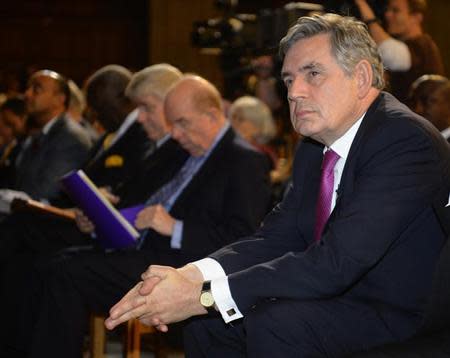Ex-British PM Brown favours more powers for Scotland, not independence

By Belinda Goldsmith LONDON (Reuters) - Former British Prime Minister Gordon Brown emerged from the shadows on Monday to argue for more powers for Scotland rather than independence, stepping up the opposition Labour party's fight to prevent a Scottish breakaway from the United Kingdom. Brown, a Scot who has kept a low profile since losing the 2010 general election, said he intended to play a major role to stop Britain coming apart at the September 18 Scottish referendum by giving voters an alternative to independence. Nationalists arguing that an oil-rich Scotland can be a prosperous, independent nation are lagging in the polls but have gained some ground this year to narrow the gap, prompting British officials to warn against complacency before the vote. In a speech delivered in Glasgow, Brown said the once-centralised union of England, Scotland, Wales and Northern Ireland had evolved and he advocated a constitutional shake-up allowing more power-sharing. He was quickly backed up by another Scottish political heavyweight, Menzies Campbell, the former Liberal Democrat leader, who called for a "political coalition" on devolution. "The majority of Scottish people do not want separation but equally they do want change," Brown said. "I want to move us from the old highly centralised, uniform Britain dominated by out-of-date ideas of an undivided Westminster sovereignty to a new diverse power-sharing, risk-sharing, resource-sharing UK which is best defined ... as a modern, constitutional partnership of nations." Scotland set up its own parliament in Edinburgh in 1999 after a referendum on devolution, with the London parliament handing over powers for issues such as education, health, transport and housing to Scottish lawmakers. 307-YEAR-OLD SCOTTISH TIE WITH ENGLAND Labour dominated the Scottish parliament until 2007 when it was overtaken by the Scottish National Party (SNP), which is now pushing for Scotland to end its 307-year tie with England. Brown ruled out independence but said it was time to go further with devolution and revamp the United Kingdom's relationship with Scotland, proposing six constitutional changes that he has submitted to Labour's devolution committee. The committee will report to the party conference later this month as Labour struggles to find one voice on devolution. The changes include a guarantee of the permanence of the Scottish parliament, a new division of powers, a new tax-sharing agreement, and more powers for local communities. Scottish leader Alex Salmond urged all Britons last week to back his independence campaign to help create a northern economic counterweight that would stop a dominant London from sucking the life out of the rest of the country. Prime Minister David Cameron, whose Conservatives govern in coalition with the Liberal Democrats, last month urged residents of England, Wales and Northern Ireland to lean on Scottish friends and family to stick with Britain as they were best and strongest together. Devolution, rather than outright independence, is favoured by a majority of Scots in opinion polls. Campbell, tasked with finding a cross-party alternative to independence, endorsed Brown's call for the Scottish parliament to be permanent, adding Scotland should be able to raise more than 50 percent of its own taxes. He said the process of further devolution should start immediately if there is a No vote in September, urging all parties to commit to meeting within 30 days in that scenario. But the SNP said the lack of consensus over a time frame for devolution indicated it would not happen. "It is clear that the only way to guarantee further powers is to vote Yes for independence in September," said Roderick Campbell, a Scottish parliamentarian from North East Fife. (Editing by Mark Heinrich)

